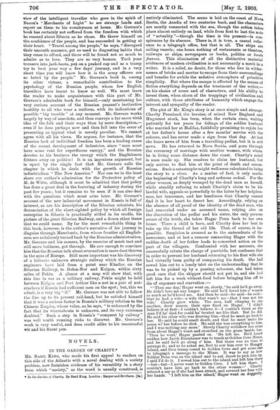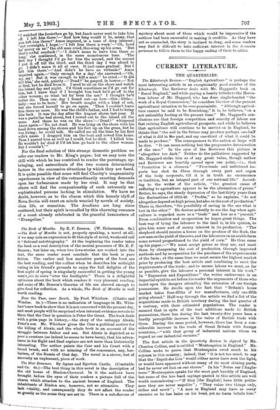NOVELS.
IN THE GARDEN OF CHARITY.*
Ma. Beath KING, who made his first appeal to readers on this side of the Atlantic with a novel dealing with a society problem, now furnishes evidence of his versatility in a story from which "society," as the word is usually construed, is
• In the Garden of Charity. By Basil King. London : HarperandBrothers. [Be.]
entirely eliminated. The scene is laid on the coast of Nova Scotia, the Acadia of two centuries back, and the character,
are mostly connected with the sea, though the action takes place almost entirely on land, while from first to last the note of " actuality "—though the time is the present—is con. spicuous by its absence. There is, it is true, a casual refer- ence to a telegraph office, but that is all. The ships are
sailing vessels ; one hears nothing of restaurants or theatres, railways or ships, newspapers or books, polities or haute finance. This elimination of all the distinctive material evidences of modern civilisation is not necessarily a merit in a writer. It is a relief, no doubt, for those who live in wilder- nesses of bricks and mortar to escape from their surroundings and breathe for awhile the sedative atmosphere of primitive simplicity. But where the escape is effected by the means of fiction everything depends on the treatment of the writer,— on his choice of scene and of characters, and his ability to invest them, when shorn of the trappings of civilisation and
culture, with those attributes of humanity which engage the interest and sympathy of the reader.
The plot of Mr. King's story is at once simple and strange. Charity Penland, the heroine, of mixed New England and Huguenot stock, has been, when the curtain rises, waiting patiently for ten years for tidings of the soldier husband who married her at Halifax, faithfully promising to rejoin her at her father's house after a few months' service with the colours, and has never made a sign from that day. At last she hears news of him from a travelling pedlar, but it is evil news. He has returned to Nova Scotia, and gone through the ceremony of marriage with another woman, with whom
he is living some distance down the coast. Charity's mind is soon made up. She resolves to claim her husband, but only arrives to find him at the point of death and uncon- scious. Such a catastrophe might well seem calculated to bring the story to a close. As a matter of fact, it only marks the beginning of Charity's long and arduous ordeal. For the other woman, as deeply wronged by the dead man as herself, while steadily refusing to admit Charity's claim to be his lawful wife, appeals so powerfully to the latter by her helpless- ness, her innocence, and her loneliness that Charity cannot find it in her heart to desert her. Accordingly, relying on the absence of all proof of the identity of the dead man, who had remarried under an assumed name, relying also on the discretion of the pedlar and his sister, the only persons
aware of the truth, she takes Hagar Penn back to her own home. There a child is born, and Charity does her best to take up the thread of her old life. That, of course, is im- possible. Suspicion is aroused as to the antecedents of the newcomer, and at last a rumour connecting Hagar with the sudden death of her father leads to concerted action on the part of the villagers. Confronted with her accusers, she successfully rebuts the charge of parricide, but confesses that in order to prevent her husband returning to his first wife she had virtually been guilty of compassing his death. She had rowed him out to a lonely islet on the understanding that he was .to be picked up by a passing schooner, she had taken good care that the skipper should not put in, and she had left him for a week without food before bringing him off to die of exposure and starvation :-
" Then one day,' Hagar went on, slowly, he said he'd go away. He didn't love me any longer. He said he'd loved lots o' women as much as he'd loved me. And then he said—he said—he said— that he had a wife—a wife that wasn't me—that I was not his wife.' Charity grew white. The men, half clinging to one another, drew nearer, their eyes fixed on Hagar. I didn't believe it at first—I couldn't believe it—I couldn't think as the man I'd ha' died for could ha' treated me like that. But he did. He said his other wife was drawing him—that he must go back to her. He said he could smell death, and that he must make his peace wi' her before he died. He said she was everything to him, and I was nothing any more.' Slowly Charity withdrew her arms from about Hagar's waist and crouched on the grass beside her. Then he went,' Hagar panted on. He left me. He'd heard sudden how Jacob Eisenhauer was to touch at Golden Cove Mines, and he said he'd go along o' him. But there was no time to arrange it; and so he asked me, first to row him over to Hungry Island, and then tramp round to Golden Cove and get some one to telegraph a message to the Mines. It was to say as how Soldier Penn was on the island and to ask Jacob to pick him tip. I said I'd do it. I rowed him out to the island and left him there —but—but—I never went to Golden Cove. I left him there. I couldn't have him go back to the other woman—' Charity uttered a cry as if she had been struck, and covered her face with her hands. I left him on the island,' Hagar went on doggedtr: I wattled the Leviathan go by, but Jacob never sent to take him efr I left him there.'—' And he* long would it be, missy, that you left him there P Amos inquired, in a tone of deep interest; not overnight, I hope.'—' I left him there a week.'—' Oh, Lord ha' mercy on us !' the old man cried, throwing up his arms. But that's awful oonduck !'—' I didn't mean to leave him there so long,' she continued, in the same monotonous tone. The first day I thought I'd go for him the second, and the second I put it off till the third, and the third day I was afraid to go. I didn't mean it all at once. It just came gradual. But I left him there.'—' And didn't he have no victuals ?' Amos inquired again.—' Only enough for a day,' she answered.—'Oh, my, my ! But it was enough to kill a man ! ' he cried.' It did kin him,' she said, quietly.—' Dead ?' he gasped, in horror.= Not at first, but he died from it. I used to sit on the shore and watch the island day and night. I'd think sometimes as Pd go out for him, but I knew that if I brought him back he'd go off to the other woman ; so what 'nd ha' been the use ? I thought he'd better die. Then one day I found out—as how—this—little- baby—was to be born.' Her breath caught with a kind of sob, but she forced herself to go on again. Then I couldn't leave him there no more. He was the child's father, and I had to bring him back. It was the day after the August storm last year. It was a partic'lar bad storm, but I rowed out to the island all the same. And there he was on the shore.'—' Dead ? ' whispered Amos again.—' No, not dead. He was lying on the shore with his head down among the stones and his feet up on the grass, but he was living ; he could talk. He called me all the time by his first wife's name. I dragged him on the boat and rowed him home. Then I nursed him as well as I could, but he died. I killed him. He wouldn't ha' died if I'd let him go back to the other woman. But I wouldn't.'"
For the final solution of this strange domestic problem we refer our readers to Mr. King's pages; but we may note the skill with which he has contrived to render the parentage, up- bringing, and antecedents of the two women determining factors in the successive situations by which they are faced. It is quite possible that some will find Charity's magnanimity superhuman in view of the extraordinarily exacting demands upon her forbearance made by her rival. It may be that others will find the companionship of such extremely un- sophisticated persons lacking in stimulation. We have no doubt, however, as to the charm which this homely idyll of Nova Scotia will exert on minds wearied by novels of society, slum life, or sensation. The Acadians are long since scattered, but their spirit is recalled by this charming romance of a coast already celebrated in the graceful hexameters of "Evangeline."











































 Previous page
Previous page